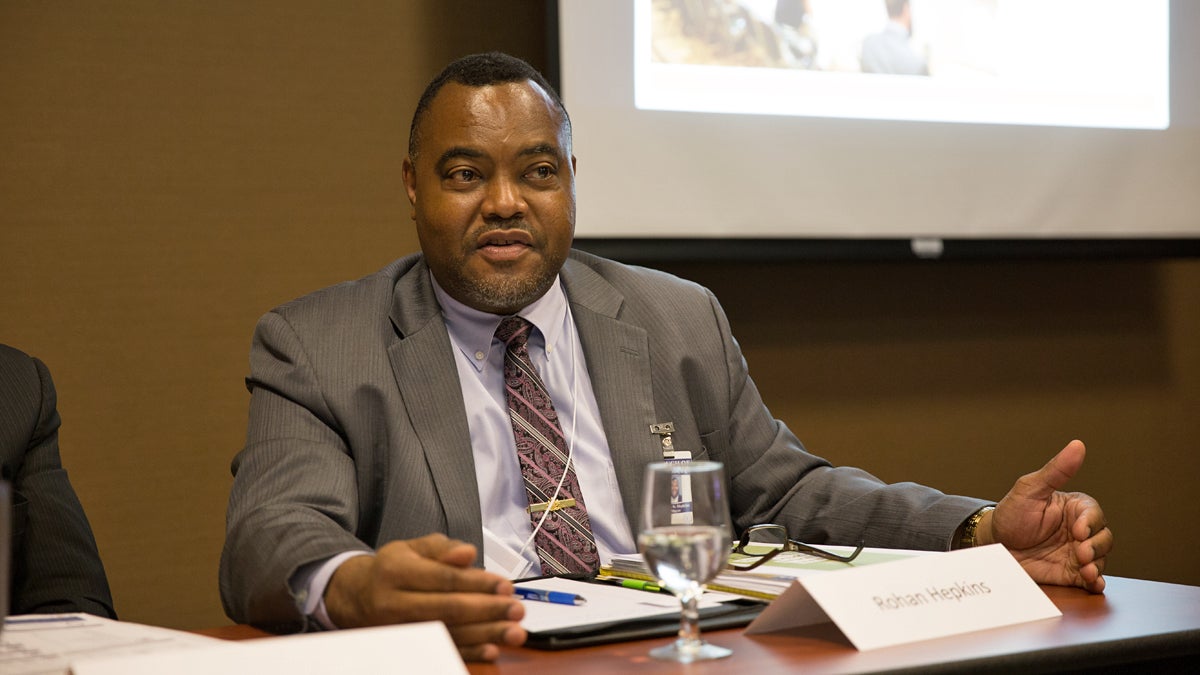Ideas Worth Stealing: Cooperate — or create a crisis

The cavalry isn't coming, said Yeadon Mayor Rohan Hepkins
Community planning and leadership are increasingly critical as dysfunction snowballs in Harrisburg and Washington, specialists say.
Local government in Pennsylvania is notoriously fragmented, and that hurts older cities and urban communities.
But proposals for consolidation and service sharing can be politically divisive and little has been done to address the issue.
We talked about prospects for action with four practitioners on the ground: Yeadon Mayor Rohan Hepkins, Berks County Community Fund President Kevin Murphy, CONNECT Executive Director Kristen Michaels and Rick Vilello, executive director of the Governor’s Center for Local Government Services in the state Department of Community and Economic Development.
Is there a legislative fix?
Lancaster Mayor Rick Gray actually jumped in at this question from a fellow audience member.
“There won’t be inter-municipal cooperation until the state incentivizes it financially,” Gray said.
He recalled the 13-town Lancaster Inter-municipal Committee had 15 members at one time. But two withdrew: those “with the most money and highest education,” he said.
“The level of elitism just reeked,” Gray said. “And you have that problem when you have a city that’s a large minority community and large Latino community, and you have surrounding suburbs that are white, that depend on property taxes and also earned income tax which they earn in the city and are paid in the suburbs. … How you get over that is beyond me.”
The panelists’ consensus was that local governments shouldn’t count on the state and/or federal government to initiate change or new programs that might be beneficial to municipalities.
“The cavalry isn’t coming.” -Yeadon Mayor Rohan Hepkins
Other levels of government are simply too dysfunctional right now, said Berks County Community Fund President Kevin Murphy.
“I have never seen Harrisburg more dysfunctional and unlikely to do anything significant, as it is today,” Murphy said. “I think these decisions are going to be local for as far as the eye can see.”
Bright(ish) spots
There are, however, a couple areas where there’s potential for change at the state level, according to Rick Vilello, executive director of the Governor’s Center for Local Government Services in the state Department of Community and Economic Development.
One is pension reform, said Vilello, also the former mayor of Lock Haven.
“We have to make sure municipal pensions aren’t left by the wayside in state discussion about pension reform,” he said. “Even if all of the things addressed in the auditor general’s report were implemented, it’s still a 10, 20-year process ’til we stabilize. … But it would allow municipalities to plan.”
That’s part of the problem when it comes to consolidation or service-sharing: it often only happens when municipalities are struggling.
The mission of the University of Pittsburgh’s CONNECT program is to find smarter ways to do things before desperation sets in, says executive director Kristen Michaels.
The nonprofit’s member municipalities — Pittsburgh and 36 surrounding communities — work together to decide what to focus on.
Right now, one is consolidating the region’s sewer system.
The Allegheny County Sanitary Authority handles wastewater treatment for 83 municipalities.
And Michaels says each of them will deed over their water/sewer lines to ALCOSAN, if all continues to go according to plan.
One might expect municipalities to cling to this infrastructure as an asset, though. It might be seen as a potential source of cash.
So how do you get them to let go?
“Peer pressure,” according to Michaels.
And timing.
Before they sign off, municipalities surrounding Pittsburgh want more representation on the ALCOSAN currently structured in a “city-heavy” manner, she said.
“It’s kind of a chicken and egg thing,” Michaels said.
Crisis creep
Vilello also described the quiet crisis that is volunteer firefighting in Pennsylvania.
“There are 25 paid fire departments, 91 paid and volunteer, and 1,740 completely volunteer departments. The average age of a volunteer in Pennsylvania is 56 years old. In the last 30 years, we’ve gone from 300,000 to 71,000 volunteers,” he said. “It’s a crisis.”
Charging for that service might prompt municipalities to enter cooperative agreements with their urban cores, making cost distribution fairer, Murphy said.
“We do not think about the extent to which we shift the burden onto the poorest residents in our communities,” Murphy said. “Lancaster, York, and Reading all are home to county courthouses that require police protection, require fire protection and are serving people like me who don’t pay for it. And we don’t think about that at all. We think these decisions were made by bad people running cities poorly instead of understanding that the state has very clear structural problems. And that state police requirement is absolutely the biggest one.
“And by the way,” Murphy said, “cities could eliminate their police departments and the state would be required to provide police protection. And that’s what I keep telling mayors to do. Create a crisis.”
WHYY is your source for fact-based, in-depth journalism and information. As a nonprofit organization, we rely on financial support from readers like you. Please give today.



